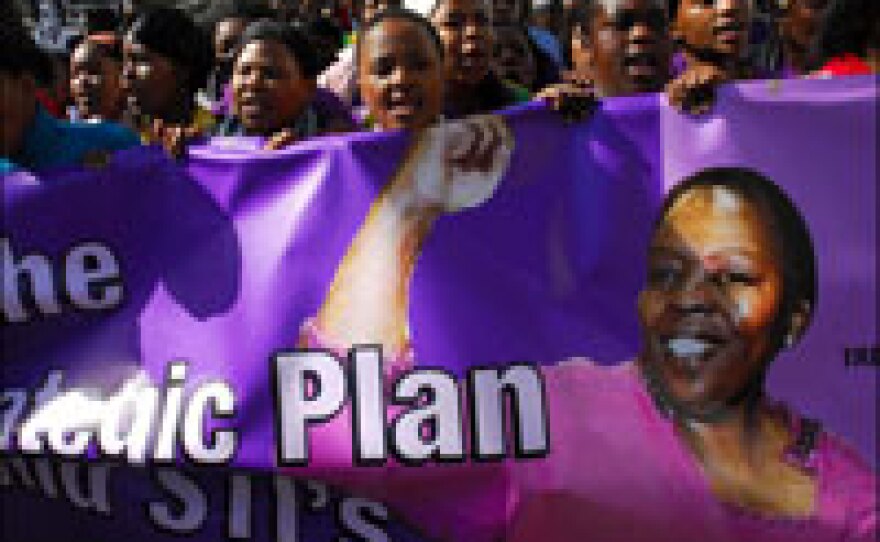

In South Africa, the ruling African National Congress party is expected to consider its next leader in December. Much hangs on the decision. The ANC dominates parliament, and a new party chief will likely be South Africa's next president.
As the decision approaches, the issue of HIV/AIDS, a catastrophic public health problem that will continue to challenge South Africa's leadership, has become dangerously politicized.
A visit to the Avalon Cemetery in Soweto illustrates the crisis. On a recent Saturday morning, the cemetery is noisy and crowded bumper to bumper with buses, BMWs and even a bicycle. In the cold, flat field outside Johannesburg, there are three funerals going on at the same time.
The Avalon is where the people of Soweto buried many of their political heroes, the ordinary men and women who stood up to, and were cut down by, the hard reality of apartheid. But these days, people in Soweto are burying those who have fallen to a different reality — AIDS. There are scores of fresh graves in the dead yellow grass.
"It's a chaos," says Father Benedict Mahlangu, who presides at St. Margaret Catholic Church in Diphloof, Soweto. "[There is] no more respect as before. We're just putting a person in the hole and we just go home."
Mahlangu's flock is dying. Some Saturdays, he says, he buries as many as four members of the congregation, and there are more funerals during the week. He blames AIDS for many of the deaths, but few of the families do so publicly. The stigma is still too strong.
"They won't tell you it's HIV. They won't just be open and say that. Mostly, they'll say it's pneumonia or cancer. But you know ... it is not the truth," he says. "Because it's unusual every week burying young people suffering from cancer or pneumonia."
Government's Disease-Fighting Record Inconsistent
South Africa has the highest number of people infected with HIV in the world. Health advocates estimate that nearly 1,000 South Africans die from AIDS-related illnesses every day and 500 to 1,000 more are newly infected with HIV. However, the government's record on fighting HIV/AIDS has been dangerously inconsistent.
"People are dying completely, completely unnecessarily," says Kerry Cullinan, who manages Health-e, a South African news agency that covers government policy and action on AIDS. "We've got the drugs now. They are cheap. But people are dying and dying and dying, and children are being forced to have lives that are more miserable than they were under apartheid."
Cullinan and others acknowledge that South Africa has made progress on HIV prevention and treatment. South Africa's anti-retroviral program, for instance, provides medication to hundreds of thousands of people. And in March, parliament passed an ambitious plan that sets five-year goals for reducing HIV infections nationwide.
The government has earmarked plenty of money for the plan. But President Thabo Mbeki has a well-publicized suspicion of anti-retroviral treatments. Of late, the government has shown no vigor in trying to meet its goals.
Cullinan says the African National Congress must make HIV prevention and treatment a top priority.
"The ANC has a conference coming up in December," she says. "And there are very clear battle lines drawn between different camps within the ANC. But, for me, what is one of the really sad things is that there's nobody who is brave enough to say, 'We need a massive plan. We want to reach out to every single person who needs treatment.' There's nobody saying those kinds of things."
Activists Campaign Against 'Dr. Beetroot'
Enter Manto Tshabalala-Msimang, South Africa's minister of health. She reportedly shares the president's distrust of anti-retroviral medications and has become public enemy No. 1 among AIDS activists, who refer to her as "Dr. Beetroot" or "Dr. Olive Oil." They accuse her of dragging her feet on drug programs — including one that would protect babies from contracting HIV from their mothers.
Last year, Tshabalala-Msimang represented South Africa at an international conclave and extolled the power of salad fixings — beetroot, olive oil and a variety of fruits and vegetables — to fight the effects of HIV.
"I have seen people take their last bit of money to go and buy a bottle of olive oil. And then drink it, and then get worse diarrhea," says Zackie Achmat, South Africa's most-renowned AIDS activist and the co-founder of an organization called the Treatment Action Campaign. The group has successfully sued the government more than once to set anti-retroviral drug programs in motion. It is now calling for the health minister to be fired.
"You cannot in South Africa today refuse to implement policies which are going to save lives today. And that's criminal," he says. "I want to see her well and healthy and in jail."
Advocates are so angry because, for a brief period earlier this year, things seemed to be going their way. Tshabalala-Msimang was sidelined by a liver transplant, and her deputy, Nozizwe Madlala-Routledge, appeared to put AIDS at the top of the ministry's agenda.
For the first time in a long time, the nation saw a unified effort between the ANC-led government and health care activists to do something about AIDS. But last month, the deputy was fired. Mbeki said she was not a team player.
Neither the health minister nor her former deputy responded to requests for an interview.
The resulting controversy has had a polarizing effect across the country and even prompted a walkout of opposition lawmakers in parliament.
"It's just a moral failure on the part of Mbeki," says Xolela Mangcu, a political newspaper columnist in Johannesburg and a research fellow at Witwatersrand University. "It's the most glaring challenge of our time, and whoever comes after him has to put this thing on the agenda."
National unease on the topic of AIDS predates Mbeki's presidency. Even Nelson Mandela has reportedly said privately that he wishes he had done more to combat the disease. But it is widely believed that Mbeki, more than any other individual, will be judged by what South Africa has failed to about AIDS, even as the graveyards fill.
Copyright 2022 NPR. To see more, visit https://www.npr.org. 9(MDAzMjM2NDYzMDEyMzc1Njk5NjAxNzY3OQ001))







